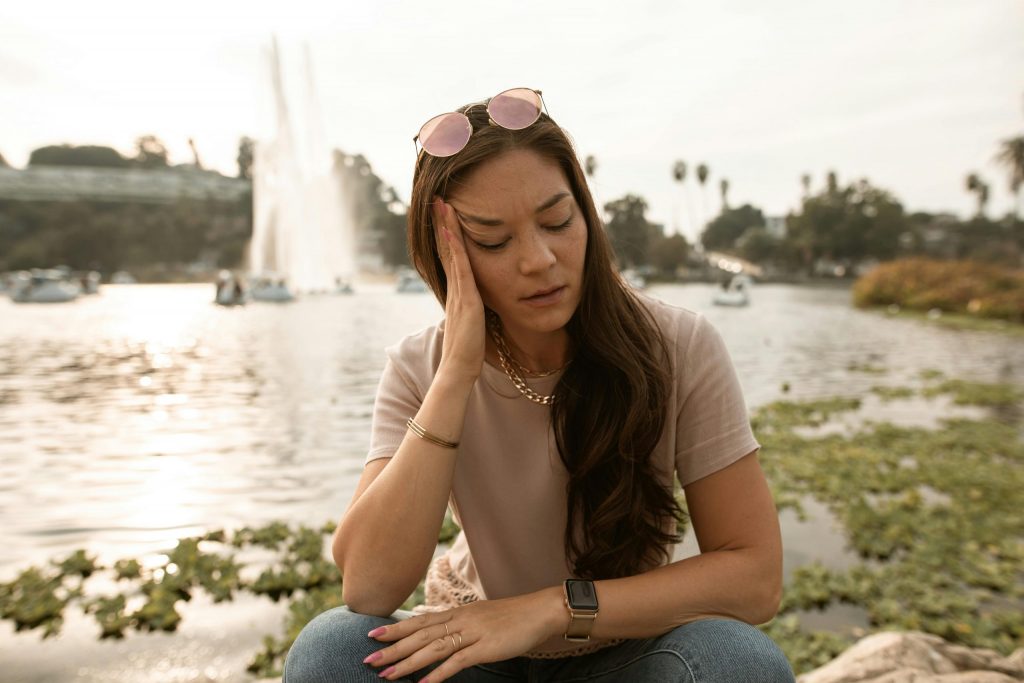Menopause is the point in time when a person has gone 12 months in a row without having a period. It is a significant and natural phase in a woman’s life, typically occurring in the late 40s or early 50s, marking the reproductive years’ end. During this phase, anxiety is one of the common symptoms that women experience. For example, a study by Bromberger and colleagues in 2013 acknowledges the fact that women who experience low anxiety in the reproductive years may experience higher anxiety during and after the menopausal transition. Additionally, a study of women aged between 40 and 60 by Li and colleagues in 2016 in China showed that around 13% of them suffered from anxiety symptoms. Similarly, a survey study by Jaeger and colleagues in 2021 in Brazil showed that nearly 60 % of women who were experiencing perimenopause had anxiety symptoms.
The relationship between menopause and anxiety is complex, involving hormonal changes, psychological factors, symptoms of the menopause itself and overall health.
Cause of Anxiety during Menopause
Hormonal Influence
During menopause, oestrogen levels decline. The hormone plays a crucial role in regulating mood and emotions. For example, a book called Estrogen Receptors Modulation of Anxiety-Like Behavior by Borrow and Handa in 2017 acknowledges the fact that oestrogen influences anxiety and anxiety-like behaviour.
Psychological Factors
During the transition into menopause, women may experience anxiety due to a variety of psychological factors, such as concerns about the ageing process. For example, in the large study conducted in 2023 by Gao and colleagues with participants from the UK Biobank, it was revealed that biologically older individuals were more prone to experiencing symptoms of depression and anxiety. This suggests a potential link between biological ageing and anxiety issues during the menopausal transition.
Physical Symptoms
Physical symptoms of menopause, such as sleep disturbances, can contribute to anxiety. For example, a study by Chellappa and Aeschbach in 2022 found that sleep disruption is a prominent characteristic of anxiety and anxiety-related disorders. People with anxiety often experience worsened sleep quality, indicating a continuous cycle involving poor sleep, anxiety and stress.
Furthermore, other menopausal symptoms, like hot flashes, can cause anticipatory anxiety. Anticipatory anxiety is the fear or worry of experiencing these symptoms, which can further result in feelings of anxiety. Anxiety, in turn, can lead to hot flashes. For instance, a study by Freeman and Sammel in 2016 suggests that anxiety may be a good predictor of hot flashes and is more often if someone shows a physical reaction like headache, abdominal pain and dizziness to anxiety.
Management and Treatment
Managing anxiety during menopause often involves positive lifestyle changes. For instance, a 2023 review by Erdelyi and colleagues recognises the significance of maintaining a positive lifestyle during perimenopause and menopause. This includes healthy eating, abstaining from smoking, and incorporating regular exercise. The review recommends these practices to reduce the risk of various diseases and to manage symptoms during perimenopause and menopause.
Additionally, both hormonal and non-hormonal options exist to treat Menopausal symptoms to alleviate both physical and psychological symptoms. Treatment options for hormonal or non-hormonal treatment depend upon the woman’s age and the cardiometabolic risk factors. For example, a study by Madsen and colleagues in 2023 suggests that older women of more than 60 years and a decade of completing menopause and having prior health risk factors like cardiovascular diseases, venous thromboembolism and breast cancer do not much benefit from hormonal treatment and thus non-hormonal alternate therapy should be considered. In the same study researchers suggest that younger women of less than 60 years and less than 10 years of menopause and do not have cardiometabolic co-morbidities or contradictions to hormonal therapy may benefit from hormonal treatments.
Conclusion
Anxiety during menopause is common but manageable. Understanding the interplay between psychological factors, hormonal change and physical symptoms is key to addressing it effectively. Women experiencing significant anxiety during the menopausal phase should seek support from healthcare professionals to explore appropriate treatment options.
Where to seek help?
Dealing with anxiety during the menopausal transition can be difficult. It is important to contact your GP or local healthcare provider for help. Seeking support promptly can make a big difference in helping you feel better.
References :
Borrow, A. P., & Handa, R. J. (2017). Estrogen Receptors Modulation of Anxiety-Like Behavior (pp. 27–52). https://doi.org/10.1016/bs.vh.2016.08.004
Bromberger, J. T., Kravitz, H. M., Chang, Y., Randolph, J. F., Avis, N. E., Gold, E. B., & Matthews, K. A. (2013). Does risk for anxiety increase during the menopausal transition? Study of Women’s Health Across the Nation. Menopause, 20(5), 488–495. https://doi.org/10.1097/gme.0b013e3182730599
Chellappa, S. L., & Aeschbach, D. (2022). Sleep and anxiety: From mechanisms to interventions. Sleep Medicine Reviews, 61, 101583. https://doi.org/10.1016/j.smrv.2021.101583
Erdélyi, A., Pálfi, E., Tűű, L., Nas, K., Szűcs, Z., Török, M., Jakab, A., & Várbíró, S. (2023). The Importance of Nutrition in Menopause and Perimenopause—A Review. Nutrients, 16(1), 27. https://doi.org/10.3390/nu16010027
Freeman, E. W., & Sammel, M. D. (2016). Anxiety as a risk factor for menopausal hot flashes: evidence from the Penn Ovarian Aging cohort. Menopause, 23(9), 942–949. https://doi.org/10.1097/GME.0000000000000662
Gao, X., Geng, T., Jiang, M., Huang, N., Zheng, Y., Belsky, D. W., & Huang, T. (2023). Accelerated biological aging and risk of depression and anxiety: evidence from 424,299 UK Biobank participants. Nature Communications, 14(1), 2277. https://doi.org/10.1038/s41467-023-38013-7
Jaeger, M. de B., Miná, C. S., Alves, S., Schuh, G. J., Wender, M. C., & Manfro, G. G. (2021). Negative affect symptoms, anxiety sensitivity, and vasomotor symptoms during perimenopause. Brazilian Journal of Psychiatry, 43(3), 277–284. https://doi.org/10.1590/1516-4446-2020-0871
Li, R., Ma, M., Xiao, X., Xu, Y., Chen, X., & Li, B. (2016). Perimenopausal syndrome and mood disorders in perimenopause. Medicine, 95(32), e4466. https://doi.org/10.1097/MD.0000000000004466
Madsen, T. E., Sobel, T., Negash, S., Shrout Allen, T., Stefanick, M. L., Manson, J. E., & Allison, M. (2023). A Review of Hormone and Non-Hormonal Therapy Options for the Treatment of Menopause. International Journal of Women’s Health, Volume 15, 825–836. https://doi.org/10.2147/IJWH.S379808
© 2024 Dr Mukta Bhattarai Pandey (MD, PGDip Public Health, MRCP(UK), MRes)
